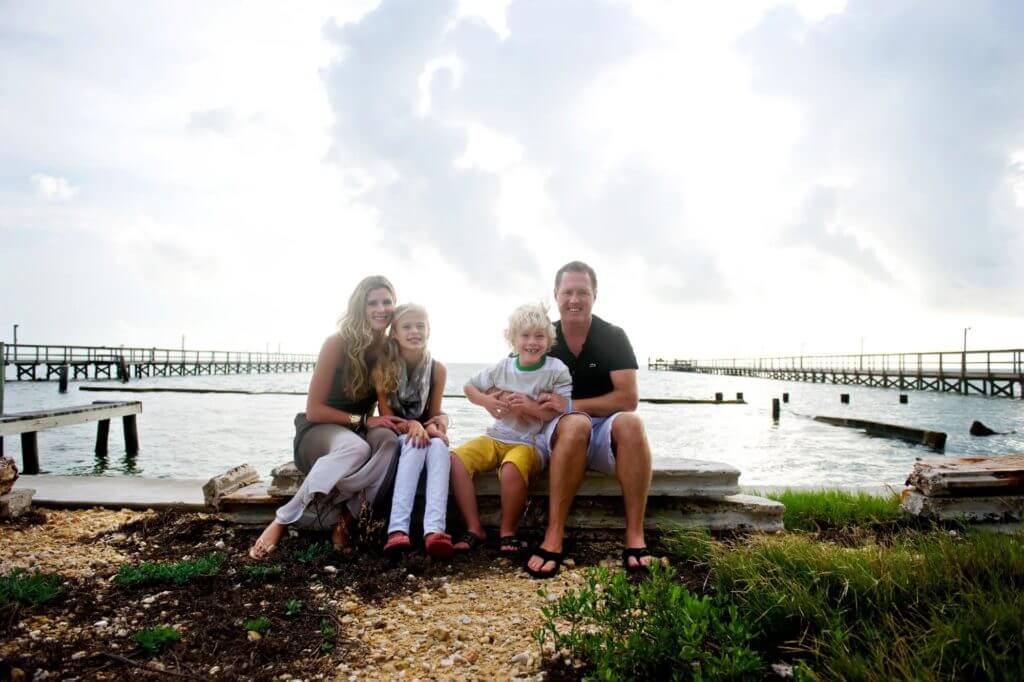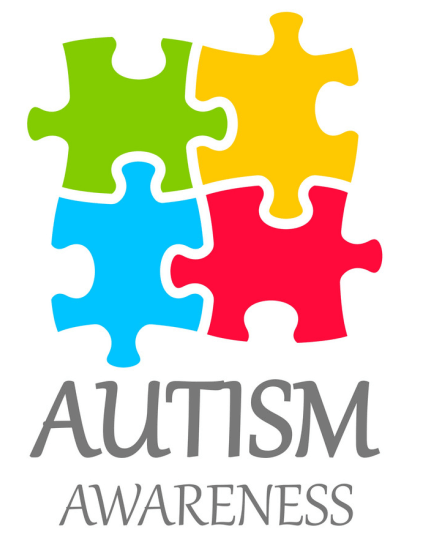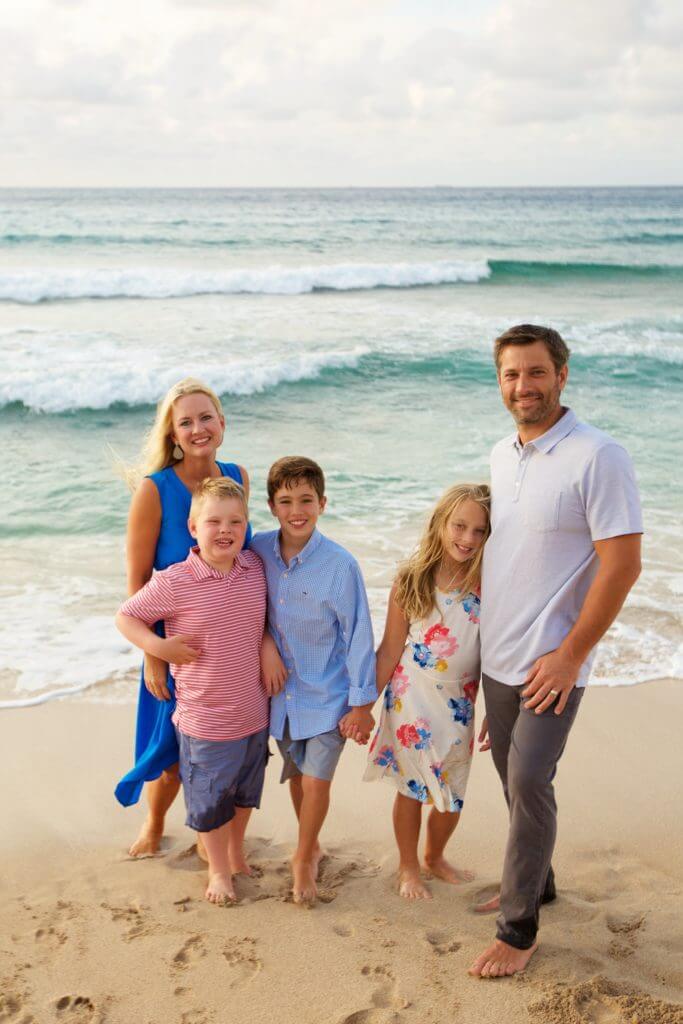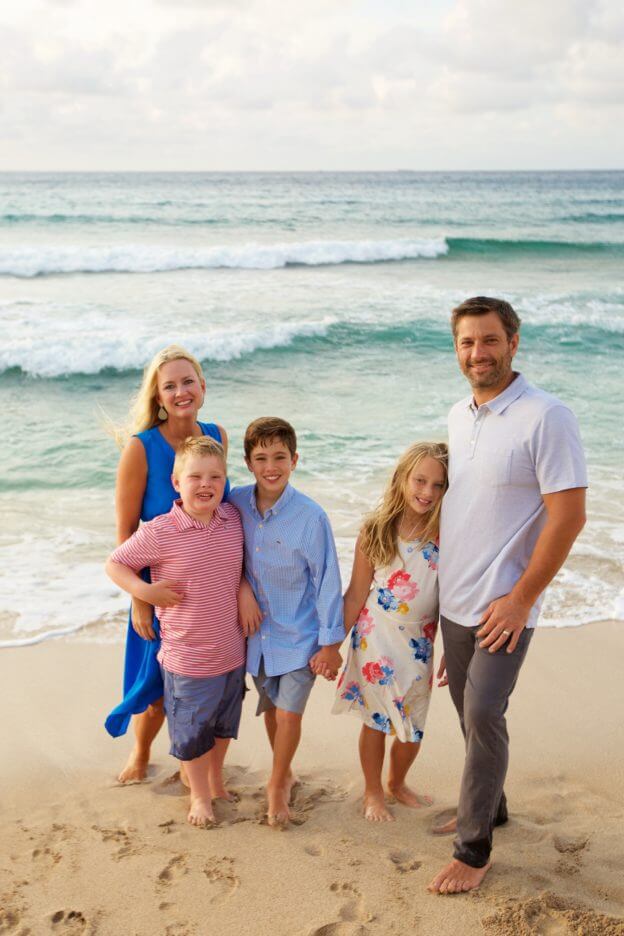By SARAH DOOLITTLE, Four Points News
April is National Autism Awareness Month and two local families living with autism share what their lives look like, how their children might behave differently from other children, and how lack of awareness about autism affects them every day.
Mindy Minto lives in Steiner Ranch with her husband Sean and their two kids, 15-year-old Delia and 12-year-old Charlie. While Delia is a typically developing child, Charlie was diagnosed at age four with autism.

Mindy, Delia, Charlie and Sean Minto of Steiner Ranch in one of their favorite family photos from a few years ago. Now the children are 15 and 12. Mindy wants to help people understand more about autism. Charlie was diagnosed with autism at age 4. “I can’t stand when people stare at him,” she said. “When he starts flapping (his hands) or is loud… I wish those stares would stop. He sees it. He understands everything that is going on around him. I feel like eventually — maybe not now but eventually — it will hurt his feelings.” Lauren Lesley Photography
Struggle to get a diagnosis
Charlie had been unable to hear for the first part of his life due to severe, chronic ear infections. Still, his parents suspected something else was wrong because, “He wasn’t talking for a long time,” said Mindy. “He didn’t walk until he was about 20 months old… So we realized there was obviously some developmental delays happening.”
Mindy had no known risk factors for autism: she was 29 when he was born and there is no known family history of autism. And Charlie didn’t fit all the autism stereotypes; he regularly made eye contact and was outgoing with others.
All of which contributed to the difficulty of getting a diagnosis. The neurologist who treated Charlie throughout his young life insisted that Charlie was just delayed and would eventually catch up with his peers.
“Finally after three years of hearing that, I sat in the room with the doctor and I said, ‘You’re going to sit here with me until you see what I’m seeing,’” described Mindy. “About 30 minutes later it became apparent to him, and he said, ‘Okay, I was wrong.’”
New vision
While the diagnosis gave the family a direction to point for treatment options, it also meant accepting a new vision for their son’s life. said Mindy, “At first it was a hard pill to swallow. Any parent who gets an autism diagnosis — it’s hard to accept because you don’t know what to expect.”
It also meant navigating a world with which they had no previous experience: special schools that cater to kids with developmental disorders; delayed developmental milestones such as potty training; a special diet to help manage his behavior; and negotiating daily life with a child who could be unpredictable and easily set off by noises, smells or unfamiliar surroundings.
With this new world also came new expenses. “It’s like all of a sudden you have a baby and you have a college tuition on top of that. Normally people save for it,” said Mindy.
“Absolutely perfect the way he is”
Still, it was all worth it because, while inconvenient and expensive, this new life included Charlie, who his mom describes as, “the most amazing, the most fantastic person you’d ever meet in your life. The minute someone meets him they don’t want to leave him! He’s just all consuming in happiness and the most pleasant person I’ve ever been around.”
She also adds that, despite the challenges, “I wouldn’t change him for the world. He is absolutely perfect the way he is. Rather, I want the world to change for him.”
When asked what that change would look like, Mindy doesn’t hesitate. “More understanding. I can’t tell you how many times I’ve been approached and told off or told you need to control your son.”
Mindy recounts being asked on numerous occasions,”‘Can you please make him be quiet?’ I would love to!” she said with a laugh.
More than the demands to change Charlie’s behavior, “I can’t stand when people stare at him,” said Mindy. “When he starts flapping (his hands) or is loud… I wish those stares would stop. He sees it. He understands everything that is going on around him. I feel like eventually — maybe not now but eventually — it will hurt his feelings.”
In addition to wishing that people would show respect for Charlie’s humanity, Mindy would like the same, “for the families… A lot of people are really isolated with (caring for a child with autism).”
 Autism statistics
Autism statistics
Autism is defined as a developmental disorder that affects millions of children and adults in the U.S. and around the world. The Centers for Disease Control estimate that 1 in 68 children in the U.S. has been diagnosed with autism.
But a new study by the Cohen Children’s Medical Center of New York in New Hyde Park looked at data collected by the National Institutes of Health and estimated that rate to be considerably higher, with 1 in 59 children diagnosed.
Autism does not strike all children equally, however. Four boys will be diagnosed with autism for every one girl.
Furthermore, autism is what is known as a spectrum disorder, meaning that those diagnosed with autism fall on infinite points along a scale of development, from the lowest to the highest functioning and everything in between.
The family cost
The average family spends $42,000 a year on services and additional living and medical expenses, never mind the endless hours spent caring for their autistic child. “And so you look at the caregivers, too, they need people to be aware so that they have the respect and the compassion and the dignity that they deserve. Because they’re working their asses off 24/7 with these kids.”
Mindy and her husband take care of their emotional, mental and physical needs with weekend getaways and jogs in the neighborhood.
For Charlie’s sister Delia, they go out of their way to make sure she gets special one-on-one time whenever possible. “But we also tell her, sometimes she has to miss stuff,” explained her mom. “That’s the reality of it. I don’t think she knows any different… She’s really independent.”
Delia loves Charlie and is his fiercest defender. The two enjoy a normal sibling relationship, although Delia would disagree and tell you it’s not normal because Charlie is her best friend.
Mindy understands in part people’s misconceptions of her son. Charlie, “looks like a 12-year-old boy and he doesn’t have any visible differences. So it’s hard for people to understand what it is… Before this, I was as ignorant as anybody else when it came to understanding special needs.”
Autism’s lessons
Life with Charlie has taught her and her family, “compassion and empathy. Completely. He has absolutely taught me to accept differences.”
She knows, too, that others can learn the same lessons by using one simple tool. “Ask questions. Ask me anything. I’m never offended with questions,” said Mindy. “I’d rather somebody ask me a question like, ‘Why is your son flapping?’ Or ‘Why does he make that noise?’ Or ‘Why is he jumping?'”
“Any kind of communication would be better than staring or being rude. Ask me a question… Or ‘How can I help?,’” adding that, “Some people might not want to be asked questions. I love it.”
Helping others
Life with Charlie also inspired Mindy to follow an unexpected career path, and she founded both Spectrum Sitters and Spectrum Ed, businesses aimed at families living with kids on the spectrum.
The former provides babysitters specifically trained to care for children on the autism spectrum and the latter helps to connect families with educational support services.
“I’ve had clients tell me, ‘We have not ever in 18 years been able to go out,’” explained Mindy. “And it’s because you can’t just hire a 16-year-old… You need somebody that understands (autism) and respects your kid, and treats them with respect and compassion.”
Whereas Spectrum Ed has, “trained professionals that work on the behavior side to set the kid up for academic success.”
Progress
Charlie has experienced considerable growth in the seven years since his diagnosis. He recently became potty trained and appears to be able to read, though, his mom adds, “We don’t know what his intellectual ability is because it’s hard to test a kid like (Charlie).”
Still, she explained, “He’s very tech savvy. He can do anything and everything on a computer, iPhone or iPad.”
Charlie’s parents expect to be caring for their son in one form or another for the rest of their lives. This year he has started to learn vocational and life skills as part of his schooling with the goal of independent living when (and if) possible.
“My main goal for him eventually is to be a fully independent, functioning adult. What that looks like, I don’t know… He’s always going to have autism,” said Mindy.

Kristina and Ryan Ritchie have three kids Chase, Jillian and Graham, ages 11, 10 and 7. Graham has autism. The Steiner Ranch mom shares her story of living with autism during Autism Awareness Month. “Autism has taught us all to be better people,” Kristina said. Despite the hardships, “I know I am a more grateful, optimistic person because of autism.”
“A constant struggle to balance”
Another Steiner Ranch mom shares her story of living with autism. Kristina and Ryan Ritchie have three kids Chase, Jillian and Graham, ages 11, 10 and 7. Graham has autism.
“Autism has changed our family,” explained Kristina. Graham had to be switched to River Ridge Elementary from Steiner Ranch Elementary in order to be enrolled in their Early Learning program, which means having two kids at one school and one at another.
“My older two are really sad they don’t get to go to school with their brother,” she said. “But it’s what is best for our son so we’ve made the best out of it.
“We still have to hire a babysitter to attend sporting events… so we can give our other two the undistracted cheering section they deserve,” Kristina continued. Graham’s autistic behaviors mean that the family is often split up and, “Life oftentimes feels like it revolves around our son with special needs.”
It’s important to Kristina that others understand the challenges and sacrifices, which may be invisible to bystanders. “I won’t sugar coat it. We live with a constant struggle to balance,” she said. “But we try tirelessly to make sure our other two kids get all the attention, love and opportunities that they deserve.”
Chase and Jillian, like Charlie’s sister, have grown up looking out for their brother. “Our life is lived on high alert. Our older two kids have had to become protectors, little therapists and teachers at a young age,” said Kristina.
They are also witnesses to a public that can be unkind and insensitive to their son’s special needs. One day while at Randalls supermarket, Graham had a tantrum because he was denied a movie from Redbox.
As he lay on the floor melting down, Kristina said, “My daughter heard someone call her brother ‘Obnoxious.’ That is really tough, because our kids see our whole family, and especially our son, working hard every day to help him communicate better.”
Hopes for increased awareness
Kristina, like Mindy, hopes that sharing her story will increase awareness, as her two oldest kids, Chase and Jillian, were able to do at River Ridge during an Autism Awareness assembly for students.
“For me, the end goal for Autism Awareness is kindness, lack of judgement, acceptance of our differences, being comfortable with differences and embracing and supporting families and children affected by autism,” explained Kristina.
In addition, Kristina was grateful that her kids were given the opportunity to advocate for their Graham, their family and themselves.
After all, as Kristina explained, “They say, ‘To meet one person with autism is to meet one person with autism,’ and that couldn’t be more true. Every child is very different, which is why they call it a spectrum.”
Kristina could not be more proud of her unique son. “Our son is an amazing boy. He’s worked harder in his seven years of life than some people have in a lifetime. He sees the world differently, and because of that we do too.”
“Autism has taught us all to be better people,” she emphasized. Despite the hardships, “We are all more thankful for all of the little moments that are truly magical in life. I know I am a more grateful, optimistic person because of autism.”
Though as a mom, Kristina said that if she, “could take away some of the struggles he has, I would in a heartbeat. But I would never change who he is. He is adored and loved beyond belief for exactly who he is.”
Both Mindy and Kristina work every day for a world that is kinder to their kids, whether typically developing or living with autism.
And while both see what logistical support is still needed for theirs and other families living with autism — whether more early intervention, government funding or something as seemingly simple as summer camps and after school programs — their primary goal is a more compassionate, understanding society.
Kristina recounts the words spoken by a third grader at the RRE assembly. “‘Don’t stare, just care.’ She hit the nail on the head with that phrase. Just care.”


